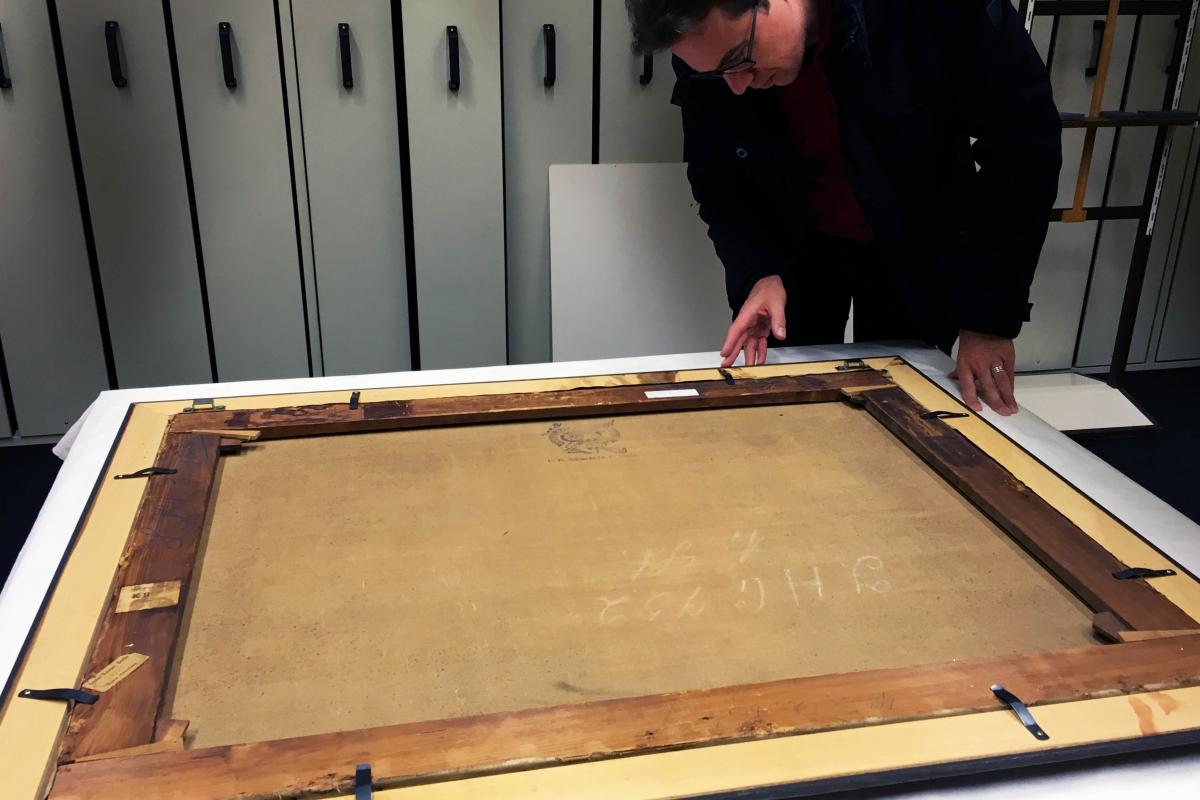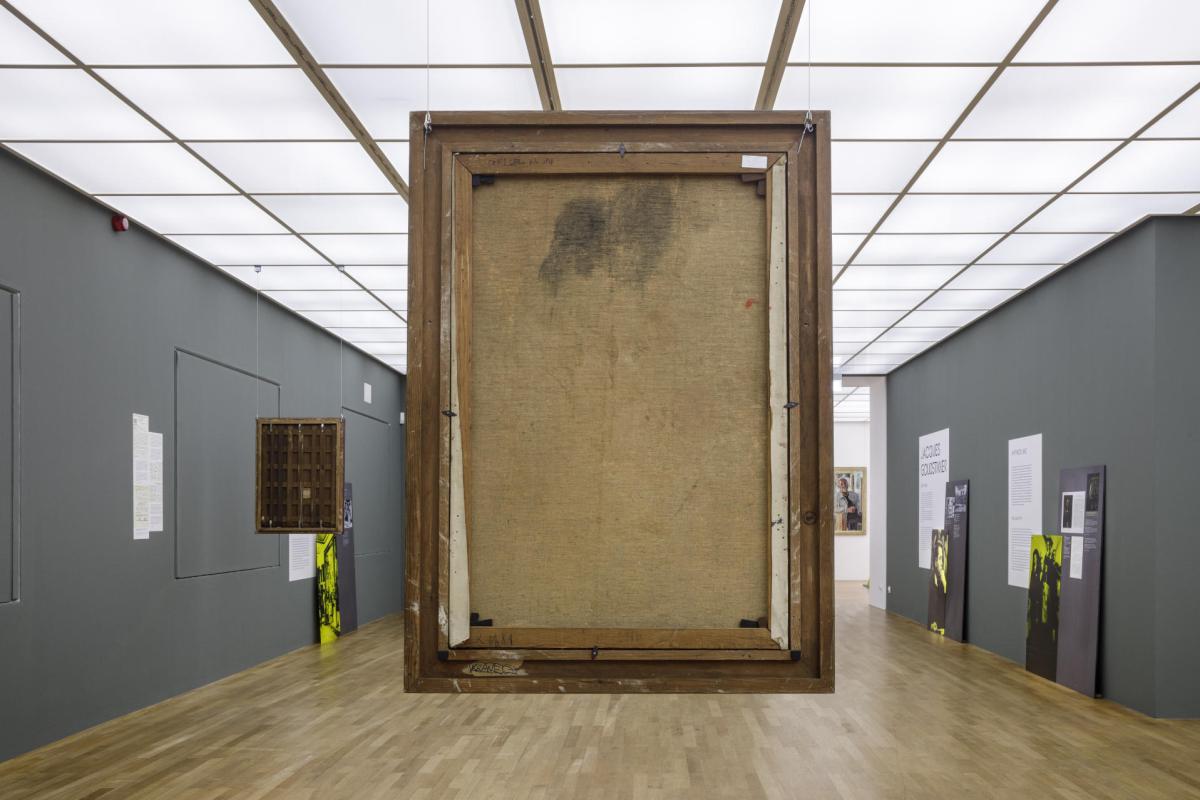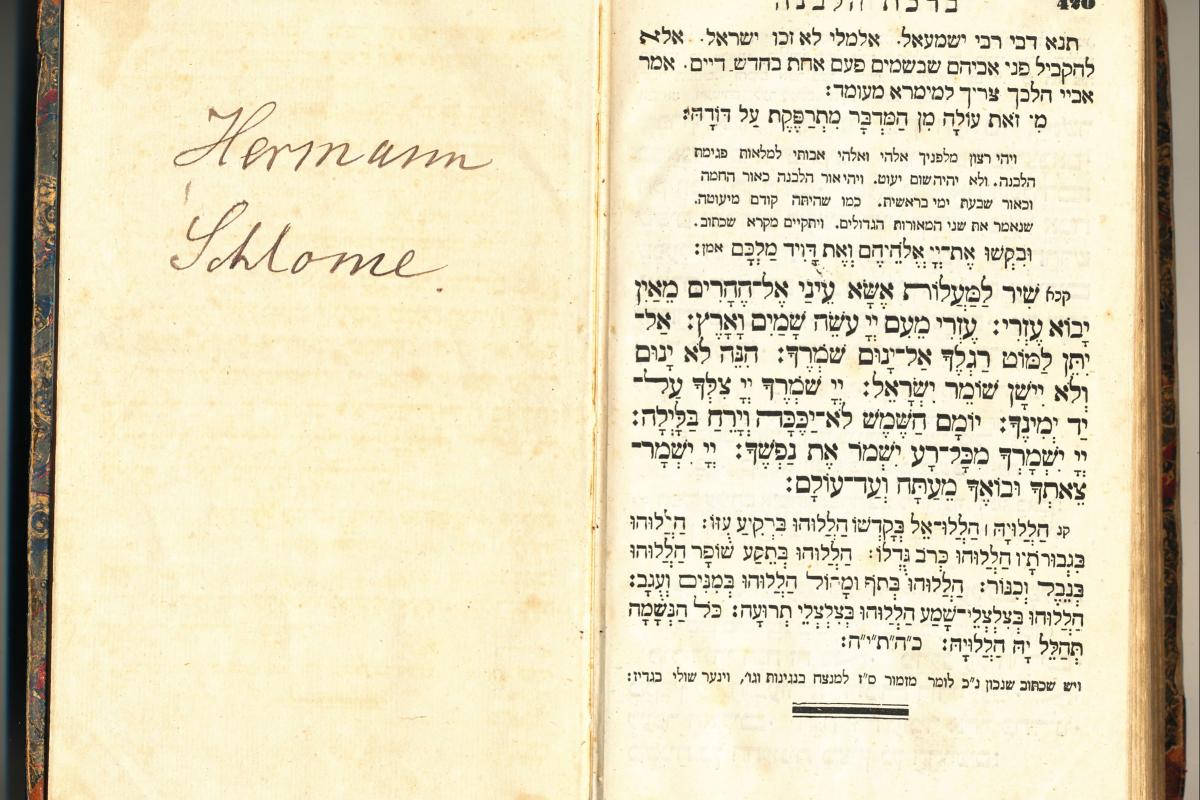Nazi-looted Cultural Property: Basics & Overview
Historical Background
When they seized power in 1933, the National Socialists began to eliminate political opponents and disagreeable organisations, gradually depriving Jewish citizens in particular of their rights. By introducing various laws and taxes or compulsory levies, the regime also created the basis for expropriating the property of political opponents and seizing the assets of Jewish citizens. The disenfranchisement and expropriation of Jewish citizens gained pace after the pogrom night of 1938, ultimately leading to the systematic murder of millions of Jewish people in Germany and in the countries occupied by Germany.
Key Events
Rise to power
“Enabling Act”
Nuremberg Laws
“Entartete Kunst” (“Degenerate Art”)
“Decree on the Registration of the Assets of Jews”
“Führervorbehalt”
November Pogroms
Forced sales
“Sonderauftrag Linz”
Start of the Second World War
“11th Decree to the Reich Citizenship Act”
Wannsee Conference
End of the war in Europe
National Socialist Art Looting
As it persecuted and exterminated people, the Nazi state sought to enrich itself extensively from their property. This applied in particular to cultural assets and works of art. Adolf Hitler (“Sonderauftrag Linz”) and high-ranking Nazi functionaries such as Hermann Göring stocked their art collections with confiscated items of property. In addition to barefaced theft, objects were frequently confiscated by indirect means: for example when persecuted individuals were forced to sell their property to pay taxes (e.g. the “Judenvermögensabgabe” (“Jewish Capital Levy”) or to finance their flight into exile. For this reason, items of cultural property that were not looted directly but handed over or sold under duress are likewise considered to be cultural property epropriated as a result of Nazi persecution.
“Washington Principles” and “Joint Declaration” (Common Statement)
After the end of the Second World War, the Western Allies established the basis for confiscated property to be returned to its rightful owners. Legal provisions in the Federal Republic of Germany also resulted in return and compensation in the post-war years. Nonetheless, many victims were unable to assert their claims or were unable to enforce them in the face of resistance from many quarters. Moreover, as a result of the Cold War, the GDR and Eastern Europe were largely left out of the issue of restitution. From the mid-1970s onwards, legal claims were considered time-barred.
It was not until the end of the Cold War and German reunification that a restitution debate slowly began to pick up again: the Washington Principles were adopted at an international conference in 1998: 43 states and 13 non-governmental organisations committed to identifying works of art seized as a result of Nazi persecution and to arriving at just and fair solutions with the owners or heirs. In Germany, the Federal Government, the Länder and the national associations of local authorities, as the bodies responsible for public institutions, issued the Joint Declaration (Common Statement) in 1999: in this, they committed to working towards the return of cultural property seized as a result of Nazi persecution. Although the declaration is a voluntary commitment which cannot be enforced by law, it has significant binding force in moral and political terms.
Washington Principles
Principles of the Washington Conference With Respect to Nazi-Confiscated Art Published in Connection with the Washington Conference on Holocaust-Era Assets, Washington D.C., 3 December 1998
In developing a consensus on non-binding principles to assist in resolving issues relating to Naziconfiscated art, the Conference recognizes that among participating nations there are differing legal systems and that countries act within the context of their own laws.
- Art that had been confiscated by the Nazis and not subsequently restituted should be identified.
- Relevant records and archives should be open and accessible to researchers, in accordance with the guidelines of the International Conference on Archives.
- Resources and personnel should be made available to facilitate the identification of all art that had been confiscated by the Nazis and not subsequently restituted.
- In establishing that a work of art had been confiscated by the Nazis and not subsequently restituted, consideration should be made for unavoidable gaps or ambiguities in the provenance in light of the passage of time and the circumstances of the Holocaust era.
- Every effort should be made to publicize art that is found to have been confiscated by the Nazis and not subsequently restituted in order to locate its pre-War owners or their heirs.
- Efforts should be made to establish a central registry of such information.
- Pre-War owners and their heirs should be encouraged to come forward and make known their claims to art that was confiscated by the Nazis and not subsequently restituted.
- If the pre-War owners of art that is found have been confiscated by the Nazis and not subsequently restituted, or their heirs, can be identified, steps should be taken expeditiously to achieve a just and fair solution, recognizing this may vary according to the facts and circumstances surrounding a specific case.
- If the pre-War owners of art that is found to have been confiscated by the Nazis, or their heirs, can not be identified, steps should be taken expeditiously to achieve a just and fair solution.
- Commissions or other bodies established to identify art that was confiscated by the Nazis and to assist in addressing ownership issues shuld have a balanced membership.
- Nations are encouraged to develop national processes to implement these principles, particularly as they relate to alternative dispute resolution mechanisms for resolving ownership issues.
Joint Declaration (Common Statement)
Statement by the Federal Government, the Länder and the national associations of local authorities on the tracing and return of Nazi-confiscated art, especially Jewish property, December 1999
In accordance with the requirements of the Allied restitution provisions, the Federal Act on Restitution and the Federal Indemnification Act, the Federal Republic of Germany has fulfilled merited claims on grounds the confiscation of works of art by the Nazi regime after WW II, and set up the necessary procedures and institutions for enabling persons entitled to such indemnification to enforce their claims vis-à-vis other parties liable to restitution. The claims primarily arose to those who immediately suffered damage and their legal successors or, in case of Jewish assets without heirs or Jewish assets that were not claimed, to the successor organisations established in the Western zones and Berlin. The material restitution was effected either on a case-to-case basis or by global settlement. The restitution law and the general civil law of the Federal Republic of Germany thus finally and comprehensively provide for issues of restitution and indemnification of Nazi-confiscated art , especially from Jewish property. In the German Democratic Republic (GDR) the compensation pursuant to Allied law of wrongs perpetrated under National Socialism did not go beyond a rudimentary stage. In the course of German reunification, the Federal Republic of Germany has undertaken to apply the principles of the restitution and indemnification law. Nazi-confiscated art was returned or indemnified in accordance with the provisions of the Vermögensgesetz (Property settlement Act) and the NSVerfolgtenentschädigungsgesetz (Federal Indemnification Act concerning persons who suffered damage at the hands of the National Socialist regime). Thanks to the global filing of claims on the part of the Conference on Jewish Material Claims against Germany Inc. (JCC) in its capacity as today’s association of successor organisations claims situated in the accession area with regard to cultural property of Jewish parties having suffered loss. As formerly in the West German Laender, material indemnification on a case-to-case basis was sought; where this was not possible, compensation was effected by global settlement.
I. Irrespective of such material compensation, the Federal Republic of Germany declared its readiness at the Washington Conference on Holocaust-Era Assets on 3 December 1998 to look for and identify further Nazi-confiscated cultural property in so far as the legal and factual possibilities allow and, if necessary, take the necessary steps in order to find an equitable and fair solution. Against this background, the decision by the Foundation Board of the Prussian Cultural Heritage Foundation of 4 June 1999 is welcomed.
The Federal Government, the Laender and the national associations of local authorities will bring their influence to bear in the responsible bodies of the relevant statutory institutions that works of art that have been identified as Nazi-confiscated property and can be attributed to specific claimants are returned, upon individual examination, to the legitimate former owners or their heirs,respectively. This examination includes a match with material compensation already provided. Such a procedure allows to identify the legitimate owners and avoid duplicate compensation (e. g. by repayment of compensations already paid).
The relevant institutions are recommended to negotiate the extent and procedure of return or other material indemnification (e. g. in the form of permanent loans, financial or material equalisation) with the clearly identified legitimate former owners or their heirs, respectively.
II. The German public institutions such as museums, archives and libraries have supported the tracing of Nazi-confiscated art already in the past by means of
- exploitation of and access to the data research findings and records available to them
- investigations in case of concrete inquiries and research, on their own initiative, in case of new acquisitions,
- search activities in the framework of the institutions’ tasks
- providing information on the history of Nazi-confiscated art in collections, exhibitions and publications.
These efforts shall be carried on wherever there is sufficient reason.
III. Furthermore, the Federal Government, the Laender and the national associations of local authorities consider in accordance with the principles of the Washington Conference to provide a website on the Internet with information on the following:
- What the institutions involved can do for publicising art of unclear origin to the extent that is presumed to have been confiscated by the Nazis.
- A search list in which every claimant may enter the items he is looking for and thus report for investigation by the relevant institutions and the interested public.
- Information on the transfer abroad of Nazi-confiscated art during or immediately after the war.
- Establishing a virtual information platform where the interested public institutions and third parties may enter their findings relating to the tracing of Nazi-confiscated art in order to avoid duplicate work on the same subjects (e. g. at which auction was Jewish cultural property of which collection sold?) and make such information available by way of fulltext retrieval.
IV. This statement refers to archives maintained by public institutions, museums, libraries and their inventory. The public bodies funding these institutions are called upon to ensure the implementation of these principles by taking decisions to this effect. Institutions under private law and individuals are called upon also to apply the principles and procedures laid down at the Washington Conference
Explanatory Video: “What are just and fair solutions?”
This film can be downloaded free of charge. It may be used and distributed under the licence CC BY-NC-ND 4.0. The German-language videos are also available with English subtitles. © Deutsches Zentrum Kulturgutverluste, bildbad
Provenance Research
Gurlitt Art Trove
The issue of Nazi-looted cultural property came to the attention of a broad international public as a result of the “Gurlitt Art Trove”. In 2013, it emerged that a large art collection had been found at the home of the art dealer’s son Cornelius Gurlitt in Munich. Since Cornelius Gurlitt’s father, Hildebrand Gurlitt (1895-1956), was an art dealer charged with the “exploitation” of “degenerate art” during the Nazi era, as well as acting as an important buyer of art for senior Nazi officials, the entire collection was suspected of being looted art.
In November 2013, the Schwabing Art Trove Task Force was established to investigate which of the works found in Munich – and later in Salzburg – had been seized as a result of persecution between 1933 and 1945. The work of the Task Force ended as planned on 31 December 2015. Financed by the Federal Government Commissioner for Culture and the Media, the project Gurlitt Provenance Research continued the research until December 2017 under the auspices of the German Lost Art Foundation. By the end of 2019, it had been determined in the case of 14 works from the “Gurlitt Art Trove” that they were most likely or definitely Nazi-looted art (so-called cultural property expropriated as a result of Nazi persecution).
In May 2020, the German Lost Art Foundation published the volume “Kunstfund Gurlitt – Wege der Forschung” as part of its series “Provenire”.
Explanatory Video on the Gurlitt Art Trove
Advisory Commission
Assistance with Provenance Research:
Guidelines
The German Federal Government, the Länder (Federal States) and the National Associations of Local Authorities have published guidelines for the implementation of the “Washington Principles” and the “Joint Declaration” (Common Statement). These offer legally non-binding guidance for independent provenance research on Nazi-looted cultural assets in public as well as private museums, collections, libraries and archives. The publication is aimed at those who deal with the handling of cultural assets, and practitioners of provenance research. Those with a general interest in the field of cultural assets seized by the National Socialists will find an overview of the subject and further information.
Provenance Research Manual
The “Provenance Research Manual to Identify Cultural Property Seized Due to Persecution during the National Socialist Era” serves as a practically oriented toolbox for employees of museums, libraries and archives, those working in cultural administrations, the art and antiquarian book trade, and also for people involved with private collections. The manual provides the necessary tools for anyone who has doubts as to the provenance of cultural assets in their own collections – whether paintings, sculptures, books, coins, porcelain, graphic art or silver cutlery: it includes practical tips and case studies as well as all the main addresses and sources.
The guide is a joint project developed with the Arbeitskreis Provenienzforschung e. V. (Provenance Research Association), Arbeitskreis Provenienzforschung und Restitution – Bibliotheken (Provenance Research and Restitution Association of Libraries); the Deutscher Museumsbund e. V. (German Museums Association) representing the interests of museums; and its counterpart, the Deutsche Bibliotheksverband e. V. (German Library Association); and ICOM Germany e. V., the German chapter of the International Council of Museums. The authors of this 135-page document have played a decisive role in the scientific, methodological and practical development of the field in recent years and contribute their profound practical experience.
The manual can be ordered free of charge from:
Deutsches Zentrum Kulturgutverluste
Anna-Katharina Köhler
Publications
Humboldtstraße 12
39112 Magdeburg
Tel: +49 (0) 391 727 763 24
E-mail: anna-katharina.koehler@kulturgutverluste.de
Search for Heirs
With its Lost Art Database, the German Lost Art Foundation offers heirs and claimants the opportunity to search for cultural property seized as a result of Nazi persecution and publish their own losses. However, it is frequently the case that the descendants of the families persecuted in the period 1933-1945 know nothing of the loss or the whereabouts of their property. The Foundation offers consistently updated information here, including details of methods, procedures, research options and sources for identifying possible heirs. The Help Desk for enquiries about Nazi-looted cultural property is also available as a point of contact. Since the beginning of 2019, it has been possible to submit a proposal to the Foundation for the funding of projects for the search for heirs.
Literature
-
Christoph Zuschlag: Einführung in die Provenienzforschung. Wie die Herkunft von Kulturgut entschlüsselt wird, Munich 2022
-
German Lost Art Foundation et al: Provenance Research Manual to Identify Cultural Property Seized Due to Persecution during the National Socialist Era, Magdeburg 2019)
-
Claudia Andratschke et al. (eds.): Leitfaden zur Standardisierung von Provenienzangaben, ed. Arbeitskreis Provenienzforschung e. V., Hamburg 2018
-
Julie-Marthe Cohen et al: Handbook on Judaica Provenance Research: Ceremonial Objects , ed. by Jewish Material Claims Against Germany (Claims Conference) & World Jewish Restitution Organization (WJRO), Berlin 2019
-
Stefan Alker et al. (eds.): NS-Provenienzforschung und Restitution an Bibliotheken, Berlin 2017
-
Sheila Heidt: Restitutionsbegehren bei NS-Raubkunst. Praxisleitfaden zur “Handreichung zur Umsetzung der ‘Erklärung der Bundesregierung, der Länder und der kommunalen Spitzenverbände zur Auffindung und zur Rückgabe NS-verfolgungsbedingt entzogenen Kulturgutes, insbesondere aus jüdischem Besitz’”, Berlin 2017
-
Uwe Fleckner et al. (eds.): Markt und Macht: Der Kunsthandel im “Dritten Reich”, Berlin 2017
-
Tanja Baensch et al. (eds.): Museen im Nationalsozialismus: Akteure – Orte – Politik, Vienna/Cologne/Weimar 2016
-
Meike Hoffmann, Nicola Kuhn: Hitlers Kunsthändler. Hildebrand Gurlitt 1895-1956, Munich 2016
-
Iris Lauterbach: Der Central Collecting Point in München. Kunstschutz, Restitution, Neubeginn. (Veröffentlichungen des Zentralinstituts für Kunstgeschichte in München 34), Munich 2015
-
Birgit Schwarz: Auf Befehl des Führers. Hitler und der NS-Kunstraub, Darmstadt 2014
-
Stefan Koldehoff: Die Bilder sind unter uns, Frankfurt 2009
-
Jonathan Petropoulos: The Faustian Bargain: The Art World in Nazi Germany, Oxford 2000
-
Thomas Buomberger: Raubkunst, Kunstraub: die Schweiz und der Handel mit gestohlenen Kulturgütern zur Zeit des Zweiten Weltkriegs, Zurich 1998
-
Lynn H. Nicholas: The Rape of Europa: The Fate of Europe’s Treasures in the Third Reich and the Second World War, New York 1994
For more literature, see our research database Proveana
Research Options
Find further research options in our research database Proveana.





